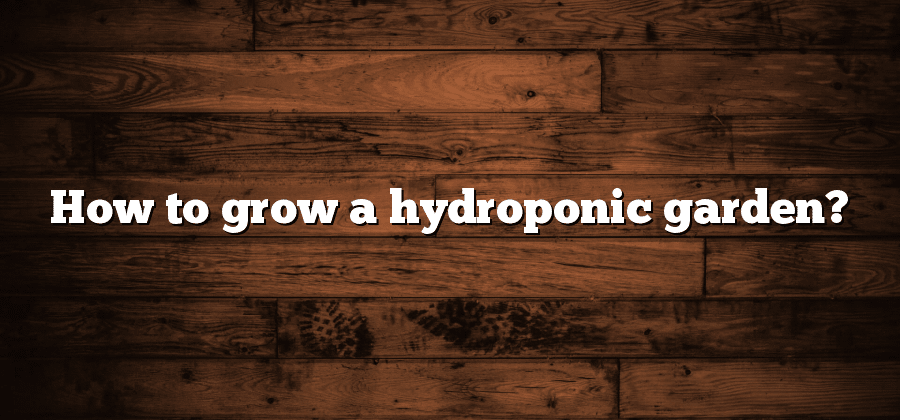Selecting the Right Hydroponic System
When it comes to hydroponics, selecting the right system is vital for the success of your garden. With so many options available, it can be overwhelming to determine which one is best suited for your needs. However, by considering a few key factors, you can narrow down your choices and make an informed decision.
Firstly, you need to assess the available space you have for your hydroponic system. Whether you have a small indoor area or a larger outdoor setup, there are systems designed to fit any space. Take measurements and consider the dimensions of the system you are considering to ensure that it will fit comfortably in your chosen location.
Next, you should consider the type of plants you plan to grow. Different hydroponic systems are better suited for specific plants and their growth requirements. Some plants thrive in deep water culture systems, while others may prefer nutrient film technique or aeroponics. Research the specific needs of your chosen plants and match them to a compatible hydroponic system.
By thoroughly assessing your space and the specific needs of your plants, you can confidently choose the right hydroponic system for your gardening endeavors. Remember, the right system can make all the difference in the health and productivity of your hydroponic garden.
Understanding the Importance of Lighting in Hydroponic Gardening
When it comes to hydroponic gardening, one of the most crucial factors to consider is lighting. In a traditional garden setting, plants receive their required sunlight naturally. However, in a hydroponic system, where plants are grown without soil, artificial lighting becomes essential for their growth and development.
Light is essential for photosynthesis, the process by which plants convert sunlight into energy. The intensity and spectrum of light that the plants receive directly impact their growth rates, yields, and overall plant health. Therefore, it is crucial to provide the right type and amount of light to ensure optimal plant growth in a hydroponic system.
Choosing the Ideal Growing Medium for your Hydroponic Garden
When it comes to selecting the ideal growing medium for your hydroponic garden, there are several factors to consider. One of the most important considerations is the water-holding capacity of the medium. Since hydroponic gardening relies on a nutrient-rich water solution to deliver nutrients directly to the plant roots, the growing medium needs to be able to retain enough moisture to support healthy plant growth without becoming waterlogged. Additionally, the growing medium should have good drainage properties to prevent the roots from becoming waterlogged, which can lead to root rot and other plant health issues.
Another crucial factor to consider when choosing a growing medium for your hydroponic garden is its inertness. In hydroponics, the growing medium is essentially a support structure for the plant roots. Therefore, it is important that the medium is inert and does not release any harmful substances that could adversely affect plant growth or introduce toxins into the system. Many hydroponic growers opt for growing mediums such as expanded clay pebbles, perlite, or even coconut coir, as these materials are inert and don’t interfere with nutrient uptake or alter the pH of the nutrient solution. Ultimately, the choice of growing medium is dependent on your specific growing objectives and the types of plants you intend to cultivate in your hydroponic garden.
Nurturing Healthy Plant Nutrition in a Hydroponic System
To ensure healthy plant nutrition in a hydroponic system, it is important to provide the plants with the necessary nutrients they need to thrive. In traditional soil-based gardening, plants extract nutrients from the soil; however, in hydroponics, the nutrients are delivered directly to the plant roots. This allows for precise control over the nutrient composition and availability, resulting in optimal plant growth.
One crucial aspect of nurturing healthy plant nutrition is selecting the right nutrient solution. The nutrient solution serves as the sole source of nutrients for the plants, so it is essential to choose a solution that contains all the necessary elements in the right proportions. The solution should include macronutrients like nitrogen, phosphorus, and potassium, as well as micronutrients such as iron, zinc, and manganese. By providing a well-balanced nutrient solution, you can ensure that your plants receive all the essential nutrients they require for healthy growth.
Monitoring and Maintaining Proper pH Levels in Hydroponic Gardens
Maintaining the proper pH levels is crucial for the success of your hydroponic garden. pH levels directly affect the availability of nutrients to your plants, impacting their growth and overall health. It is essential to monitor and adjust the pH regularly to ensure optimal conditions for your plants.
To monitor the pH levels, you will need a pH testing kit. This kit consists of test strips or a pH meter that measures the acidity or alkalinity of your hydroponic solution. It is recommended to test the pH of your nutrient solution and the runoff water from your growing medium. This will give you a comprehensive understanding of the pH levels throughout your entire system. Once you have the readings, you can then make any necessary adjustments to maintain the desired pH range for your specific plants.






